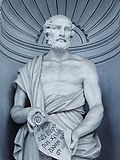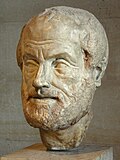Theophrastus: Difference between revisions
CSV import Tags: mobile edit mobile web edit |
CSV import |
||
| Line 26: | Line 26: | ||
[[Category:Historical figures]] | [[Category:Historical figures]] | ||
{{stub}} | {{stub}} | ||
<gallery> | |||
File:Teofrasto_Orto_botanico_detail.jpg|Theophrastus | |||
File:Aristotle_Theophrastus_Strato_Lebiedzki_Rahl.jpg|Aristotle, Theophrastus, and Strato | |||
File:Theophrastus_-_Historia_plantarum,_1549_-_3034262.tif|Theophrastus - Historia plantarum, 1549 | |||
File:161Theophrastus_161_frontespizio.jpg|Theophrastus - Frontispiece | |||
File:Theophrastus_Nuremberg_Chronicle.jpg|Theophrastus in the Nuremberg Chronicle | |||
File:Aristoteles_Louvre.jpg|Aristotle | |||
File:Theophrastus.jpg|Theophrastus | |||
File:Theophrastus_–_Opere,_1613_–_BEIC_8836731.jpg|Theophrastus - Opere, 1613 | |||
</gallery> | |||
Latest revision as of 12:02, 18 February 2025
Theophrastus (Greek: Θεόφραστος; c. 371 – c. 287 BC), a Greek native of Eresos, was the successor to Aristotle in the Peripatetic school. He came to Athens at a young age, and initially studied in Plato's school. After Plato's death he attached himself to Aristotle. Aristotle bequeathed to Theophrastus his writings, and designated him as his successor at the Lyceum. Theophrastus presided over the Peripatetic school for thirty-six years, during which time the school flourished greatly. He is often considered the father of botany for his works on plants.
Life[edit]
Theophrastus was born in Eresos in Lesbos in 371 BC. He was interested in biology, particularly botany and zoology. He succeeded Aristotle as head of the Lyceum.
Works[edit]
Theophrastus's most important botanical works are Enquiry into Plants and On the Causes of Plants, which were his only two surviving works. They were considered important for many centuries after his death.
Legacy[edit]
Theophrastus has been described as the "father of botany" because of the two surviving works mentioned above, which were influential in the Middle Ages and Renaissance. He also influenced the development of zoology, geography, and philosophy.
See also[edit]
References[edit]
<references />










